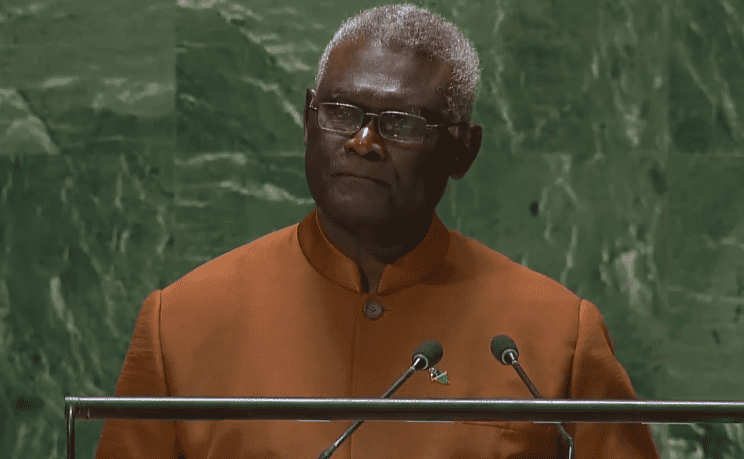Solomon Islands Prime Minister, Manasseh Sogavare, has declined a White House invitation to meet with U.S. President Joe Biden at this week’s Pacific leaders’ summit.
In a move that will further stoke Australian and U.S. concerns over Sogavare’s perceived lean towards China, Sogavare will return to Solomon Islands capital Honiara this week after delivering his speech to the United Nations General Assembly Friday night.
United States authorities are reportedly disappointed by Sogavare’s decision to decline the invitation.
He is the only Pacific leader to decline, apart from Vanuatu’s new Prime Minster Sato Kilman, who has remained in Port Vila to navigate a brewing political crisis after taking power two weeks ago.
A Solomon Islands government official told the ABC Sogavare would not attend because of “domestic issues”, saying Sogavare needs to be back in the Honiara parliament for a raft of bills, and the invitation from the White House came after parliament business had been set.
Solomon Islands Foreign Minister Jeremiah Manele will attend in Sogavare’s place.
The White House summit, in its second year, was initiated by the Biden administration to reboot relations in the Pacific region as China continues its own aggressive push.
Pacific leaders will meet with Biden and attend a range of events across a three-day period in Washington starting on Monday.
The White House said the summit was designed to “reaffirm the US commitment to our shared regional priorities and deepening our cooperation around them”.
The U.S. — by its own admission — has been largely absent in the Pacific region over the past three decades, but has been loudly proclaiming it is “back” to help with development issues and the lingering threat of climate change.
It reopened its embassy in Solomon Islands last year, and U.S. ambassador to Australia Caroline Kennedy told the ABC that Washington had “hundreds of millions” ready to spend in the country but was “waiting for permission” from the Solomon Islands government.
Western powers have been increasingly concerned over Solomon Islands’ moves towards China since it signed a secretive security pact last year.
China has been pouring money into the country and has funded a new national stadium and infrastructure developments for the upcoming Pacific Games, which will be held in November.
Sogavare has defended his country’s position, saying it is “friends to all, enemies to none”, and has rejected claims the security pact will lead to China building a military base in the country.
In his speech at the United Nations, Sogavare called for global peace and spoke about the “toxic mix of geopolitical power posturing” in the region.
The speech called for greater action on climate change, but it focused on more equity in trade and fairer partnerships for developing nations.
And in comments that will no doubt raise anxieties in Canberra, Sogavare singled out China in his speech, praising the country for its work as a development partner and highlighting the “comprehensive strategic framework” he developed with China’s President Xi Jinping during his visit in July.
“We applaud the People’s Republic of China for the initiative in accelerating the implementation of the 2030 agenda through their Belt and Road initiative, global development initiative [sic], global security initiative and global civilisation initiative,” he said.
Meanwhile, Vanuatu Prime Minister Sato Kilman will not be attending the summit with U.S. President Joe Biden this week because all government lawmakers need to be in parliament on Monday for a no-confidence vote.
Kilman was elected prime minister by lawmakers two weeks ago to replace Ishmael Kalsakau, who lost a no-confidence vote in parliament for actions including signing a security pact with U.S. ally Australia.
On Monday, Vanuatu’s parliament will hold another no-confidence vote, with the government seeking to suspend Kalsakau, a parliament official said.
All government lawmakers need to be in parliament and the trade minister has also been urgently recalled from an international visit, another official said.
“The Prime Minister will not be attending the summit because they have the parliament meeting,” said an official from the prime minister’s office.
Kilman would not have enough time to travel from Vanuatu to the United States for the Washington meeting.
The United States is seeking to open an embassy in Vanuatu and increase its engagement with the nation which has a “non-aligned” foreign policy.
China is Vanuatu’s biggest external creditor, and last month sent police experts to sign a policing agreement.
Kilman has said he would revisit a security pact signed with Australia, a major aid donor, that is yet ratified by parliament, to ensure it was in Vanuatu’s national interest.
